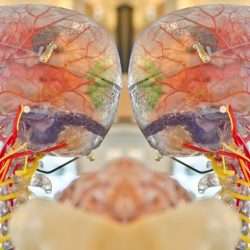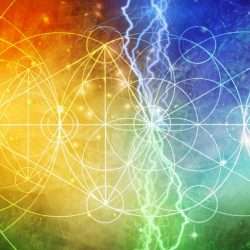As the resurgence of psychedelic drug use in the Western world takes its firm footing at the base of the underground, a new psychedelic culture is sprouting forth into the mainstream. The premise of psychedelics as tools for personal transformation and spiritual development, as well as for assisting clinical psychotherapy, is finding its foundation in the contemporary cultural ethos. With this fresh spike in popularity comes experimentation of all sorts; a double-edged sword.
Psychedelics have the potential to free us from neurotic patterns, mental illness, defunct belief systems, and address deep-seated emotional traumas successfully. However, they also have the potential to worsen these very issues. The mutability of the experience they offer is highly influenced by set, setting, and dose. Set is the mindset, or everything one brings to the experience emotionally and psychologically, including the fundamental paradigm by which they view the substance itself; setting is the physical location of the experience; and dose is the choice of substance and amount taken. Most recently, it has become more recognized that a fourth element, integration, the application of the insights garnered from the psychedelic experience into one’s daily life and basic identity, also plays a powerful role.
These elements are commonly recognized as important factors to consider within therapeutic psychedelic research, but not always understood and successfully applied within their use amongst the cultural underground. This is a vitally important issue to address, as the rising popularity of psychedelic use warrants the necessity of accurate and balanced information regarding their use to be proliferated through to the cultures experimenting with them. To do this, we need to work together to transform the cultural rhetoric surrounding psychedelics to be inspired by the constantly developing and updated human knowledge base on their potential, influencing the common ‘set’ by which they are engaged. This will help to not only lessen detrimental side effects of psychedelics within this cultural usage, but also accentuate their benefits.
Unfortunately, the common rhetoric surrounding psychedelics within the underground culture experimenting with them as tools for personal growth is not being directed by advances in scientific research (from both academic and citizen scientists) or information from elders (e.g., seasoned psychonauts and career researchers on the subject). Rather, it is being directed most readily by the merger of commonly held belief systems within new age spirituality and electronic dance music culture. This is not necessarily a bad thing, as life is an opportunity to creatively render a multitude of interesting realities for ourselves. But in order to fully advance to new levels of understanding and apply the potential of psychedelic use within contemporary human society, it is important that we create a rhetoric, a set, founded on the updated human knowledge base as a whole. It is important we build integral models for navigating the psychedelic experience that are easy to communicate and understand.
I attempted to do this for the experience of ‘magic’ psilocybin mushrooms in my book Decomposing The Shadow: Lessons From The Psilocybin Mushroom (2013).
Based on my own practice and successful convalescence from post-drug abuse depression and psychosis, Decomposing The Shadow presented a complete cognitive and conceptual model for the psilocybin experience as it relates to psychospiritual maturation and the repatterning of past emotional trauma. I discussed the history, science, spiritual practice, and psychology of the experience and explored a full picture of what the experience may show us about the nature of human emotion and how it plays out in mental health in the person and in society. The greatest focus was on the dark experiences of psychedelics and how they can be navigated to be of great spiritual and personal benefit. I also offered suggestions on setting the stage for one’s journey, as well as navigating and integrating the experience. This was done with the intention to offer an objective framework and rhetoric for navigating the psilocybin experience effectively towards personal development: self-guided psychedelic psychotherapy.
I was blown away as a self-published independent author for this book to be so well received and for its popularity to take me touring all across Canada in the summer of its release, sharing its message with others, transforming the cultural rhetoric through discourse and community. I received a lot of positive feedback and was honoured to hear how Decomposing The Shadow has positively affected so many people.
In an effort to further what I have started with that book, I offer you The True Light Of Darkness. As Decomposing The Shadow was a book presented to engage the intellect, a book established on an accessibly scholarly approach to the psychology of psilocybin-educed spiritual experiences, its demographic is limited to a certain subset of people. Within the pages of this book, I offer a storytelling narrative to engage the heart and hopefully offer my process of navigating deeply challenging emotional experiences with psychedelics to an even broader audience.
Through examining three of my own journeys, I offer a perspective on navigating and integrating psychedelic experiences that is established in the framework presented through Decomposing The Shadow, but empowered with additional insights about society, psychology, mental illness, and spirituality. Told in poetic yet intellectually accessible language, I offer you three stories of facing psychedelic darkness. With as much honesty as I could muster, each story takes place at different points of development within my own practice and they progress with increasing darkness and complexity. As they progress and as I progress, revisiting and preparing these stories for your eyes has brought me increasing perspective on what it means to learn from challenge, and I hope they can offer you the same.
2 Friends, 5 Dried Grams, and a Box from Cusco Peru takes place just before I finished my first draft manuscript of Decomposing The Shadow, over a year before its release. It begins in the daytime with two friends before progressing into contextually significant but comparatively minimal personal challenges. It is on the lighter end of psychedelic potential, as the intention between us was simply to share and explore a mushroom experience. The True Light of Darkness occurs in the winter of 2012, just before the culturally aggrandized winter equinox of December 21st. This story recounts a night with one friend that was initiated with the intention to face personal malaise and sadness. Its insights are complex and its darkness is psychotic. Embracing The Shadow; Facing Forgiveness takes place about two months before the launch of Decomposing The Shadow and was written after my summer tour. It starts with the intention to face one of the most intense bouts of depression I have ever experienced, on a high dose, in a sensory isolation float tank. It ends with having progressed through a set of emotions and thought patterns that remain amongst the most terrifying and painful psilocybin experiences I have ever had, at an intensity I hope to never face again.
Together, these three stories explore three different calibres of the psilocybin experience as they manifested in my personal consciousness, how I navigated and integrated them, as well as the explanations of the psychological, social, and spiritual mechanisms they expose.
May they find you well and benefit your journeys moving forward in life.







